AMD Ryzen 5 5600X3D
Rated: 10/10
AMD Ryzen 7 7800X3D
Rated: 10/10
Pros And Cons
| CPU | Pros | Cons |
|---|---|---|
| AMD Ryzen 7 7800X3D | ✅ Remarkable gaming performance ✅ Integration of PCIe 5.0 for faster data transfer rates | ❌ Lack of support for DDR4 memory |
| AMD Ryzen 5 5600X3D | ✅ Competitive pricing ✅ Compatibility with the widely-used AM4 socket | ❌ Limited availability |
- Regarding gaming performance, the Ryzen 7 7800X3D takes the lead with an impressive 8.1% advantage in FPS performance over the Ryzen 5 5600X3D.
- The Ryzen 5 5600X3D excels in power efficiency, boasting a remarkable 53.2% reduction in power consumption. In contrast, the Ryzen 7 7800X3D maintains a slight 4.8% edge in thermal efficiency.
- As of February 2024, the Ryzen 7 7800X3D is available for $390, while the Ryzen 5 5600X3D is not easily available in markets.
- In my view, the Ryzen 7 7800X3D proves superior for enthusiasts seeking a top-tier gaming experience, whereas the Ryzen 5 5600X3D stands out for its exceptional balance between performance and cost-effectiveness.
Comparison Table
| Feature | AMD Ryzen 5 5600X3D | AMD Ryzen 7 7800X3D |
|---|---|---|
| Codename | Vermeer | Raphael |
| No. of Cores | 6 | 8 |
| No. of Threads | 12 | 16 |
| Memory Support | DDR4-3200 MHz | DDR5-5200 MHz |
| Integrated Graphics | NA | AMD Radeon Graphics |
| Max Operating Temperature | 90°C | 89°C |
| TDP | 105 W | 120 W |
| Release Date | Jul 7th, 2023 | Jan 4th, 2023 |
| Best CPU Coolers | Best CPU Coolers For Ryzen 5 5600X3D | Best CPU Coolers For Ryzen 7 7800X3D |
| Best Motherboards | Best Motherboard For Ryzen 5 5600X3D | Best Motherboard For Ryzen 7 7800X3D |
Architectural Difference
- CPU Socket: The Ryzen 7800X3D supports AMD’s advanced AM5 socket, while the Ryzen 5 5600X3D supports only the AM4 socket. For details, read AM5 vs AM4.
- Process Node: Firstly, the Ryzen 7800X3D showcases its superiority with a cutting-edge 5nm TSMC process, while the Ryzen 5 5600X3D relies on the slightly older 7nm TSMC process node.
- Frequency: With a frequency of 4.2 GHz and a turbo clock reaching an impressive 5.0 GHz, the Ryzen 7800X3D exhibits higher processing speeds compared to the Ryzen 5 5600X3D, which operates at a base clock of 3.3 GHz and a turbo clock up to 4.4 GHz.
- TDP: Furthermore, the Ryzen 5 5600X3D carries a TDP of 105W, while the Ryzen 7800X3D has a slightly higher TDP of 120W, showcasing differences in thermal design power between the two processors.
In this comparison of the Ryzen 5 5600X3D vs Ryzen 7 7800X3D, we aim to investigate their performance through a comprehensive array of benchmarks. This analysis aims to enlighten the difference between their raw power and overall performance.
Gaming Benchmarks
We’ll now assess the gaming capabilities of the Ryzen 5 5600X3D vs Ryzen 7800X3D processors by subjecting them to a rigorous evaluation across seven taxing games, all played at the 1080p resolution.
Testing Rig
Here are the specs of the testing rig:
- Operating System: Windows 10 Pro
- GPU: Asus ROG Strix Gaming RTX 4090 24GB
- Motherboard: Gigabyte X570 Aorus Pro Wifi, GIGABYTE X670E AORUS MASTER
- Memory: G.Skill Trident Z5 RGB 32GB DDR5-6600 CL34, XPG Spectrix D50 2x8GB 3600 White DDR4
- CPU Cooler: Corsair ICUE H150I ELITE
- Power Supply: ENERMAX REVOLUTION D.F. X 105
- SSD: CORSAIR MP700 PRO 2TB Gen5 NVMe SSD
Assassin’s Creed Valhalla
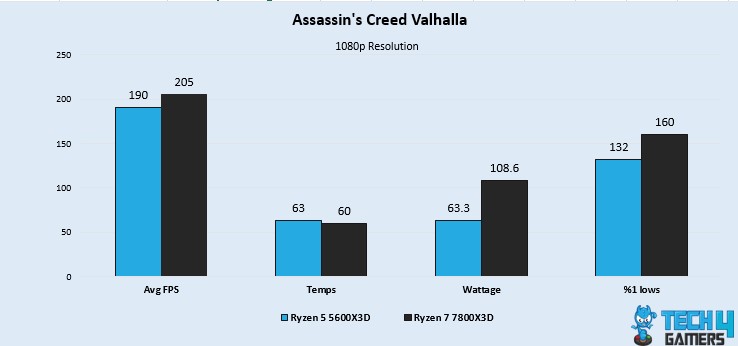
- In our first Assassins Creed Valhalla gameplay, the Ryzen 5 5600X3D falls slightly behind with an average FPS of 190, while the Ryzen 7 7800X3D takes the lead with 205 FPS, showcasing a minor 7.5% advantage.
- The Ryzen 5 5600X3D exhibits a substantial 19.1% lower 1% low performance, achieving 132 FPS, while the Ryzen 7 7800X3D maintains a higher stability at 160 FPS, resulting in a notable difference.
Hitman III
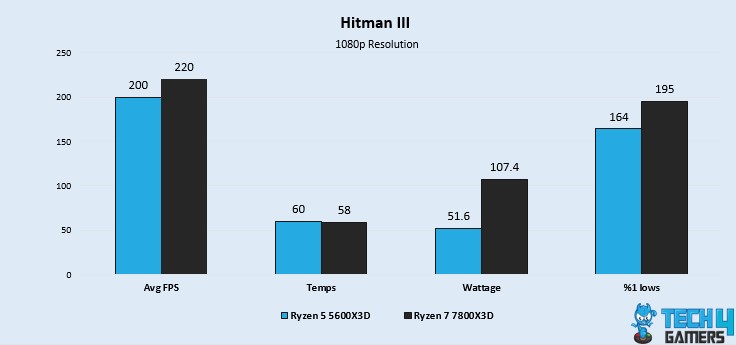
- During Hutman 3, the Ryzen 7 7800X3D shines with an average FPS of 220, surpassing the Ryzen 5 5600X3D’s 200 FPS by a notable 9.5%.
- The Ryzen 5 5600X3D performed about 17.2% lower in low1% performance, achieving 164 FPS, compared to the Ryzen 7 7800X3D’s consistent 195 FPS, resulting in a substantial difference.
Far Cry 6
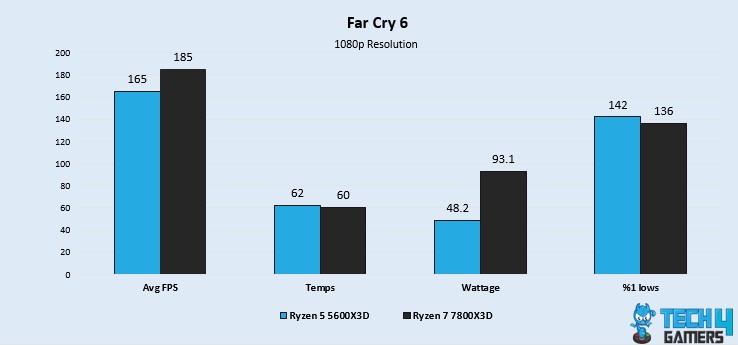
- In Far Cry 6, the Ryzen 7 7800X3D emerges as the victor with an impressive 11.4% advantage in average FPS, achieving 185 FPS compared to the Ryzen 5 5600X3D’s 165 FPS.
- With a slight performance difference, the Ryzen 5 5600X3D demonstrates a 4.3% higher 1% low performance, achieving 142 FPS, compared to the Ryzen 7 7800X3D’s relatively stable 136 FPS.
Cyberpunk 2077
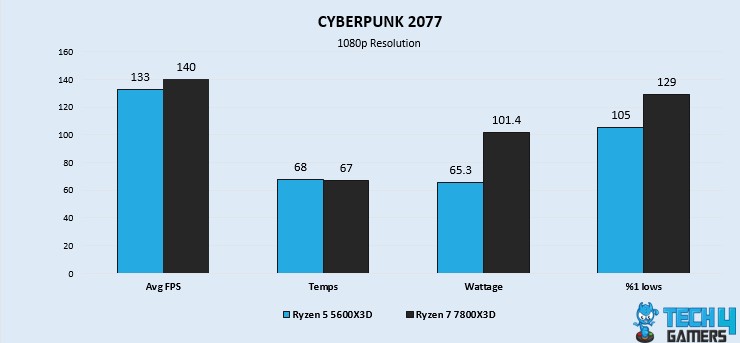
- Notably, the Ryzen 7 7800X3D boasts a 5.1% lead in average FPS performance, delivering a smoother gaming experience with 140 FPS, surpassing the Ryzen 5 5600X3D’s 133 FPS.
- The Ryzen 5 5600X3D experiences a significant 20.5% lower in 1% low performance, delivering 105 FPS, while the Ryzen 7 7800X3D maintains a solid 129 FPS.
Horizon Zero Dawn
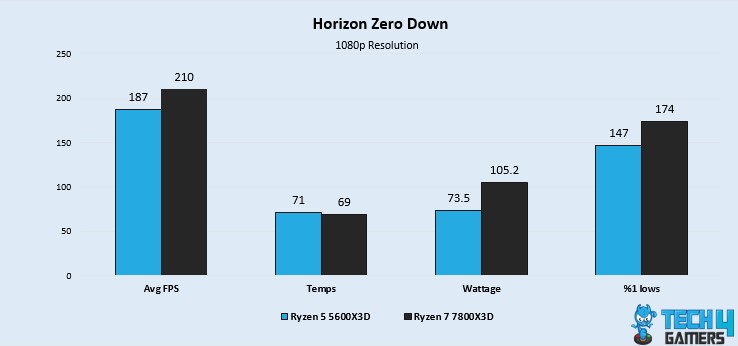
- During Horizon Zero Dawn, the Ryzen 7 7800X3D takes the lead with an impressive 11.5% advantage in average FPS, achieving 210 FPS, while the Ryzen 5 5600X3D lags behind at 187 FPS.
- The Ryzen 5 5600X3D demonstrates a noteworthy 16.8% lower performance during its least 1%, achieving 147 FPS. In comparison, the Ryzen 7 7800X3D maintains 174 FPS.
Forza Horizon 5
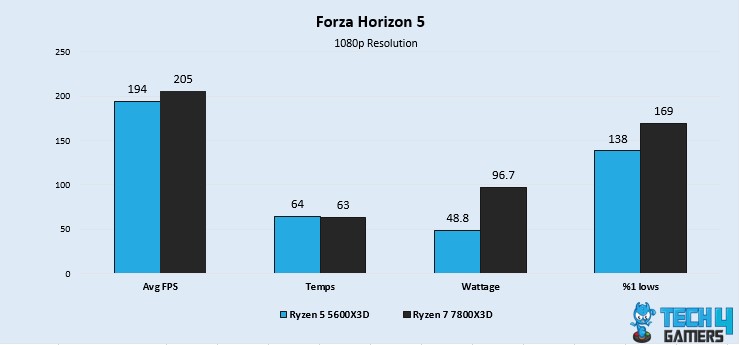
- During our last Forza Horizon 5 gameplay, the Ryzen 7 7800X3D maintained a slight 5.5% advantage, achieving 205 FPS compared to the Ryzen 5 5600X3D’s 194 FPS.
- Furthermore, the Ryzen 7 7800X3D provides a substantial 20.1% better performance in low 1%, delivering 169 FPS, while the Ryzen 7 7800X3D maintains its stability at 138 FPS.
Overall Gaming Performance
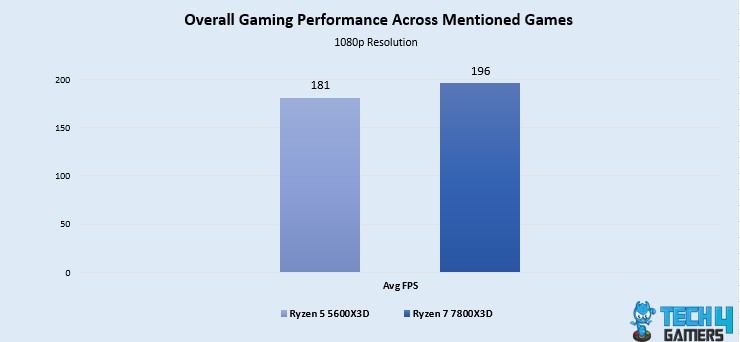
Winner: AMD Ryzen 7 7800X3D
Average Power Consumption
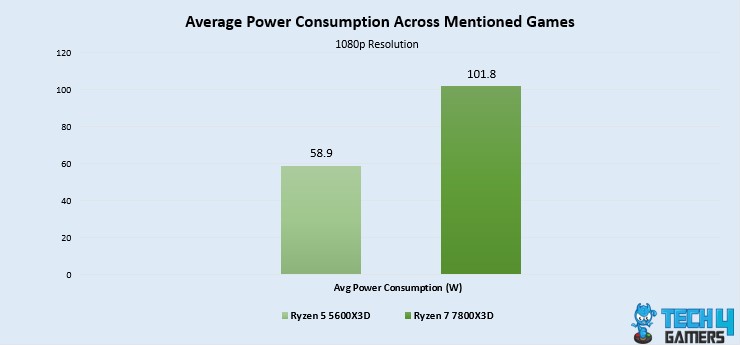
According to our power usage tests, the Ryzen 5 5600X3D stands out with an efficient average power usage of only 58.9 watts, outshining the Ryzen 7 7800X3D’s significantly higher consumption of 101.8 watts. Thus, the Ryzen 5 5600X3D outperforms the Ryzen 7 7800X3D with an impressive 72.8% energy efficiency advantage.
Winner: AMD Ryzen 5 5600X3D
Average Thermal Statistics
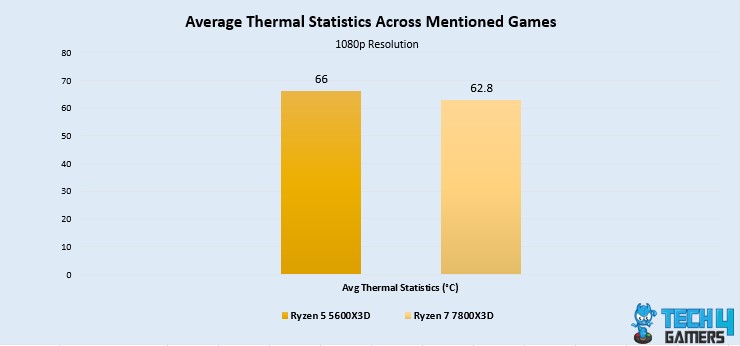
In light of our gaming temperature records, the Ryzen 7 7800X3D maintains an impressively cool operating temperature of 62.8°C, showcasing its mastery in heat management. Meanwhile, the Ryzen 5 5600X3D trails behind at 66°C. So we conclude that the Ryzen 7 7800X3D boasts a significant 4.8% advantage over the Ryzen 5 5600X3D in terms of thermal performance.
Winner: AMD Ryzen 7 7800X3D
Pricing And Availability
| CPU | Launch MSRP | Current Price |
|---|---|---|
| AMD Ryzen 7 7800X3D | 💲449 | 💲390 |
| AMD Ryzen 5 5600X3D | 💲229 | 💲209 |
| Difference | 95.6% | 86.6% |
With its cutting-edge features and exceptional performance, the Ryzen 7 7800X3D remains available at the competitive price point of $390, offering remarkable value for its advanced capabilities. On the other hand, the Ryzen 5 5600X3D was launched at a more budget-friendly price but it is not readily available in markets.
Final Verdict – What Do We recommend?
Ryzen 7 7800X3D: The Ryzen 7 7800X3D reigns supreme in gaming performance, outclassing the Ryzen 5 5600X3D with its superior FPS output. Moreover, it supports DDR5, an advanced AM5 socket and other technology upgrades.
Ryzen 5 5600X3D: The Ryzen 5 5600X3D excels in power efficiency, boasting a remarkable 53.2% reduction in power consumption. Additionally, the Ryzen 5 5600X3D presents a compelling option for those on a tight budget, delivering exceptional value at a significantly lower price point.
Ultimately, the decision rests in your hands. Ensure you pick the CPU that coordinates most effectively with your motherboard, memory, and other essential components.
More From Ryzen 7 7800X3D:
More From Ryzen 5 5600X3D:
Thank you! Please share your positive feedback. 🔋
How could we improve this post? Please Help us. 😔
[Comparisons Specialist]
I’m a passionate computer hardware expert specializing in CPUs and GPUs. With a lifelong curiosity for hardware and extensive hands-on experience, I provide valuable insights, practical advice, and in-depth analysis on these components. Engaging with the hardware community, I exchange knowledge and stay at the forefront of technological advancements.
Get In Touch: uzair@tech4gamers.com


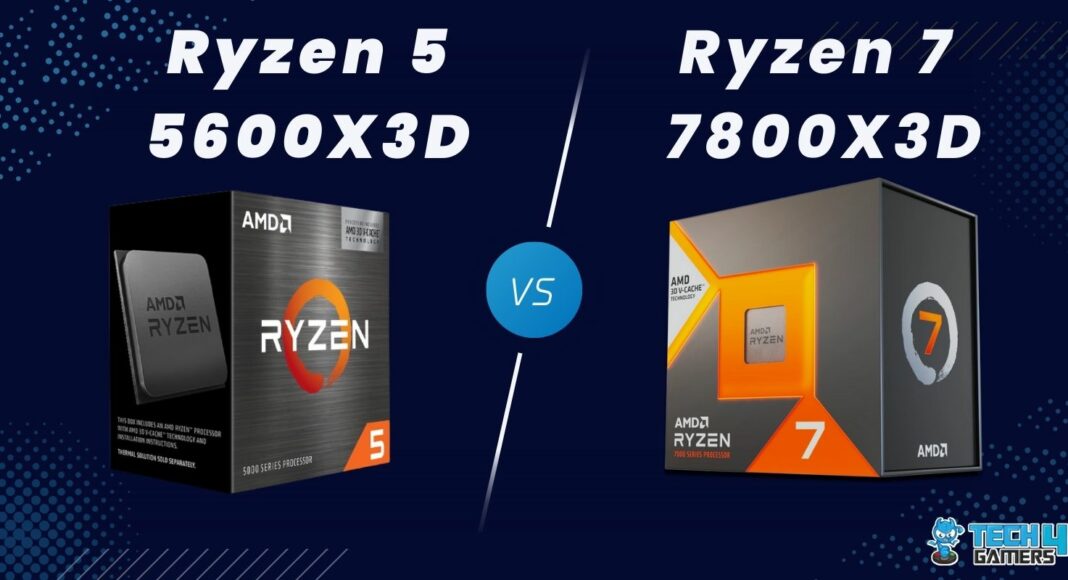

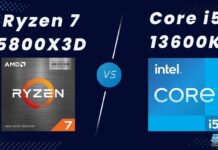
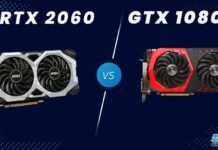
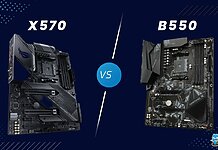
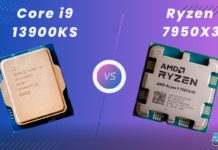
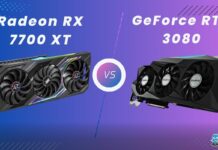
Feedback By: